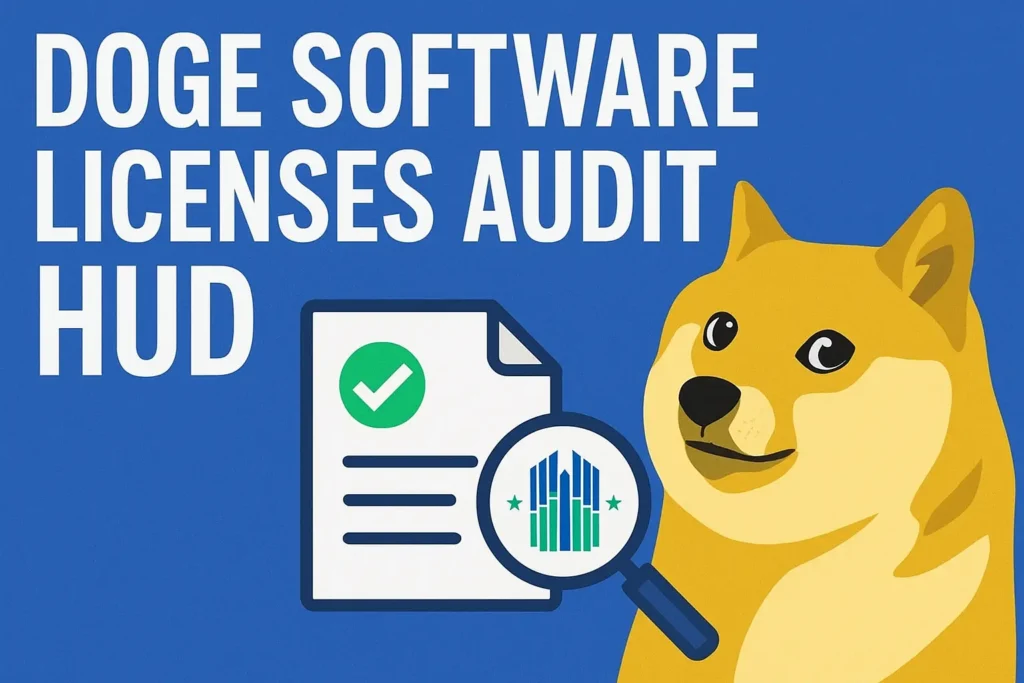The Doge Software Licenses Audit HUD has become a focal point in discussions about federal software management. At its core, this audit examined how the Department of Housing and Urban Development tracks, pays for, and uses its licensed software. The findings not only revealed inefficiencies but also underscored the importance of responsible oversight in the digital age. For taxpayers and managers alike, this case illustrates why audits of technology spending are critical.
Key findings from the Doge Software Licenses Audit HUD
The Doge Software Licenses Audit HUD highlighted an important issue: a significant gap between purchased licenses and actual usage. In some cases, thousands of licenses were sitting idle while agencies continued to pay for them. This disconnect often results from bulk procurement deals, unclear governance, or a lack of real-time monitoring tools. By identifying these mismatches, the audit shed light on millions of dollars in potential savings that could be redirected to essential services.
Why the Doge Software Licenses Audit HUD matters
Every public agency must balance budgets while delivering effective services. The Doge Software Licenses Audit HUD matters because it showed that poor tracking of software assets leads to wasted taxpayer money. Beyond the financial impact, the audit also emphasizes transparency and accountability. When agencies manage software responsibly, they build trust with the public and ensure resources are used wisely.
How audits like the Doge Software Licenses Audit HUD are conducted
Software license audits combine data from contracts, invoices, and technical monitoring. The Doge Software Licenses Audit HUD followed this model by examining purchase records and comparing them with real usage data. Auditors looked at whether licenses were assigned to active users, whether accounts had logged in recently, and whether certain software tools were consistently being utilized. These comparisons allow auditors to identify which licenses are worth keeping and which are unnecessary.
Common challenges uncovered
One of the recurring themes of the Doge Software Licenses Audit HUD was the challenge of differentiating between waste and necessary reserve capacity. For instance, agencies sometimes purchase extra licenses to cover temporary staff or contractors. Without clear policies, however, these reserve licenses often go unmonitored and become stranded costs. The audit also pointed to decentralized purchasing, where different offices buy software independently, complicating agency-wide tracking and accountability.
Recommendations from the Doge Software Licenses Audit HUD
The audit recommended several steps to improve efficiency. First, agencies should centralize their software asset management functions, ensuring all purchases and renewals flow through a single system. Second, automation tools should be deployed to continuously track license usage and highlight dormant accounts. Third, agencies need clear reclamation policies that allow them to reassign or cancel unused licenses quickly. These recommendations, if followed, could result in long-term savings and smoother operations.
The role of governance in avoiding repeated waste
Governance is at the heart of the Doge Software Licenses Audit HUD. While technology tools can provide visibility, it is governance structures that enforce accountability. Agencies need defined roles—procurement teams to negotiate contracts, IT managers to monitor use, and leadership to enforce policy. Regular reviews, quarterly reconciliations, and standardized reporting can prevent the same issues from reappearing in future audits.
What success looks like
A successful outcome of the Doge Software Licenses Audit HUD would not just be immediate savings but lasting change. That means agencies spending less on unused tools, negotiating smarter contracts with vendors, and having confidence in their usage data. It also means fewer surprises during vendor compliance checks and more trust from taxpayers who expect their money to be spent responsibly. In the long run, better management practices create stronger institutions and more effective service delivery.
Conclusion
The Doge Software Licenses Audit HUD is more than a report about software waste—it is a reminder of the importance of oversight in public spending. By shining a light on unused licenses and inefficiencies, the audit created an opportunity for change. The real measure of success will be whether agencies adopt stronger governance, better tools, and disciplined processes to ensure software investments deliver value. In doing so, audits like this help protect taxpayer money and strengthen trust in public institutions.
Frequently Asked Questions
1. What did the Doge Software Licenses Audit HUD reveal?
It revealed that HUD was paying for many unused or underused software licenses, highlighting inefficiencies and waste.
2. Why is the Doge Software Licenses Audit HUD important?
Because it shows how better oversight can save taxpayer money and improve accountability in government technology spending.
3. How was the Doge Software Licenses Audit HUD conducted?
Auditors compared procurement contracts and invoices with real usage data to identify mismatches.
4. What recommendations came from the audit?
Centralizing asset management, using automated tracking tools, and enforcing reclamation policies for unused licenses.
5. What is the long-term impact of the Doge Software Licenses Audit HUD?
If recommendations are implemented, the impact will be sustained savings, stronger governance, and better service delivery.

